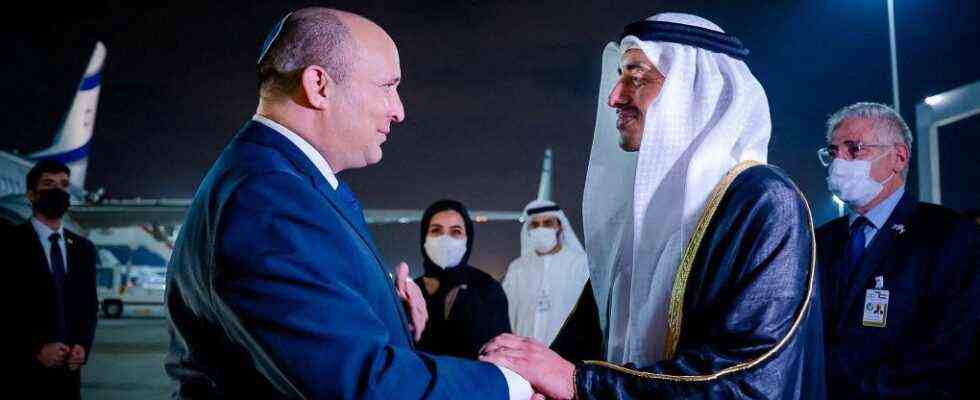It was thanks to a number of fortunate circumstances that Naftali Bennett became the first Israeli head of government to travel to the United Arab Emirates (UAE). His predecessor Benjamin Netanyahu had planned a visit several times, but something always came up: the pandemic, the Israeli election campaign, then a diplomatic dispute with Jordan, which prevented the government machine from flying over the neighboring country.
So it was left to Netanyahu’s incumbent successor for six months to descend the gangway in Abu Dhabi on Sunday evening, first to shake Foreign Minister Abdullah bin Zayed al-Nahyan both hands and then to walk through an honor trellis. A meeting followed on Monday with his brother, Crown Prince Mohammed bin Zayed Al-Nahyan, the de facto ruler of the Emirates. “Relations between the two countries have strengthened in all areas,” said Bennett, explicitly naming trade, research, cyber security, health and aviation as areas of cooperation.
It quickly became clear that the relationship between the two countries had long since emancipated itself from two of its main drivers, which – at least for the time being – are politically sidelined. In addition to Israel’s ex-Prime Minister Netanyahu, ex-US President Donald Trump played a key role in pushing Israel’s peace agreements with the Emirates.
Fundamental differences in relation to Iran
16 months after the so-called Abraham Accords were signed in Washington, the two countries no longer need a matchmaker. Relations have grown so quickly that they can withstand fundamental differences on one point that is essential for both: Iran.
Many observers had mistakenly assumed that the common opposition to Tehran was the main reason for the meeting. “That has long been exaggerated,” says Nimrod Goren, founder of the Israeli think tank Mitvim, “even if both countries continue to agree that the Iranian nuclear program is a danger and that Tehran’s influence in the region is a negative one.” But the degree of threat differs “fundamentally”, and the respective relationships with the mullah state are “fundamentally different”.
Israel is trying to escape isolation in the region
Israel is the declared archenemy, and despite all threats, the Emirates are an important business partner of Iran. Recently, the UAE have been trying very actively to diplomatically involve their Gulf neighbors – in order to arm themselves in the event that the nuclear negotiations in Vienna actually fail.
So far, Abu Dhabi has been successfully pursuing foreign policy in all directions. The volume of trade with Israel has already risen to US $ 500 million this year – from US $ 125 million in 2020, not including many major projects. Mutual investments total more than a billion dollars.
The UAE are primarily interested in Israeli water and weapons technology, and for years they have been importing Israeli surveillance software that is used to control their own population and foreign dissidents. An essential strategic component is the strengthening of the relationship with Washington through the partnership with the Jewish state. For Israel, the relations are proof that it can escape its regional isolation even without a solution to the Palestinian conflict. The second largest Arab economy also offers a large sales market and represents a potential bridgehead for Israeli trade with Asia.
During Bennett’s visit, Crown Prince Mohammed bin Zayed also expressed the hope that the relationship would contribute to “stability in the Middle East”. The first such outflow from the new partnership occurred a few weeks ago when the alliance partners signed a trilateral solar water agreement with Jordan in Dubai.

